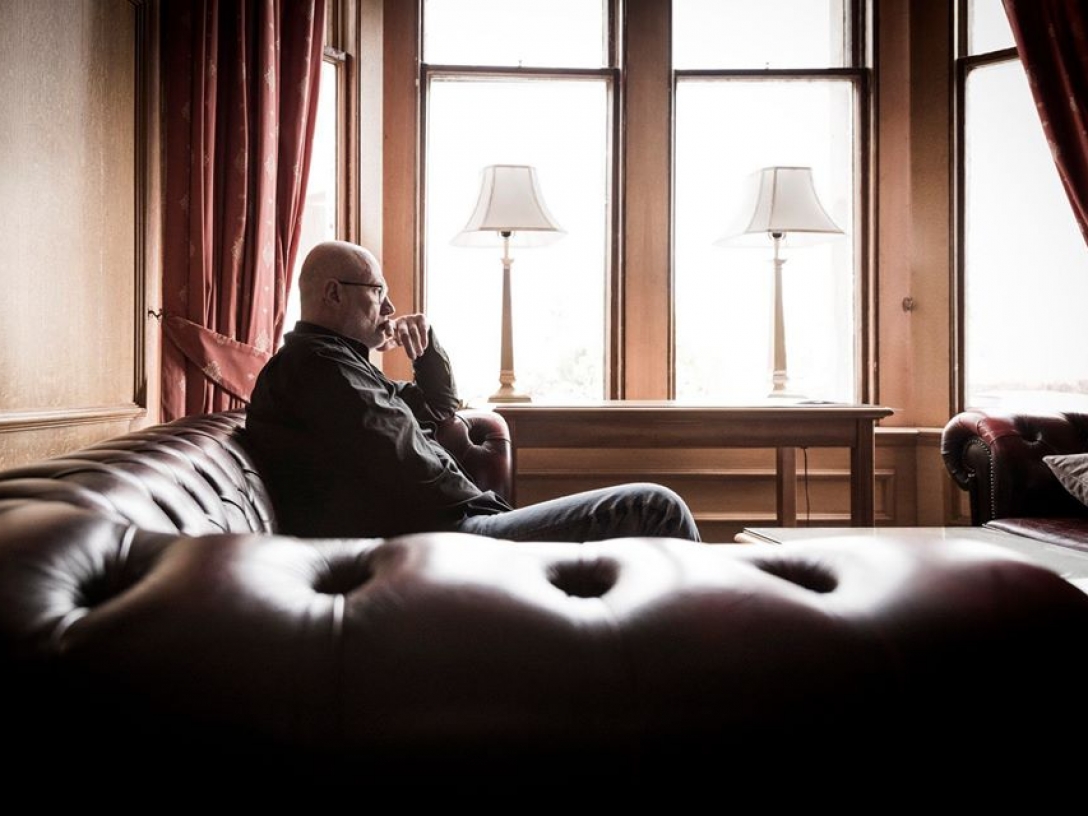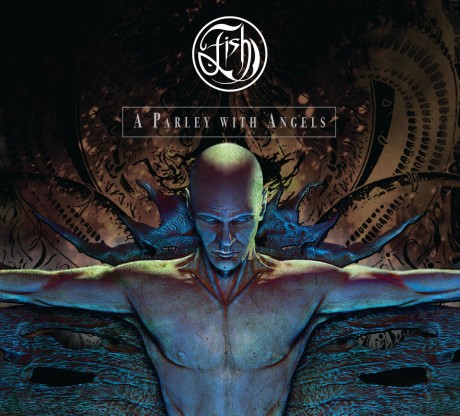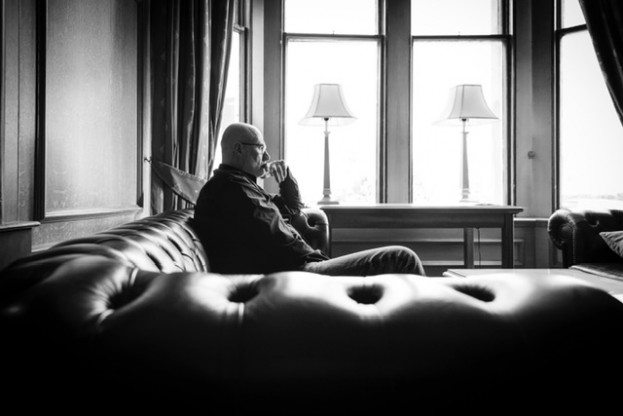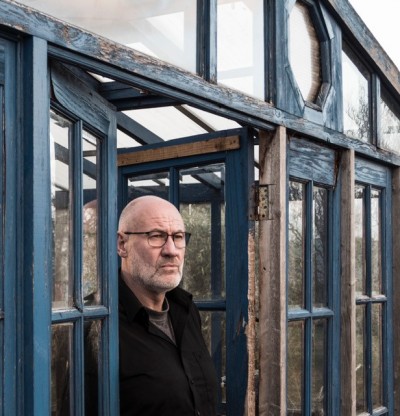A Parley With Angels: a talk with Fish (part 2) (EN)

Fish: Singer, Scotsman, passionate musician. Written in Music spoke with him about health, present-day touring, his lyrics, making music, politics, but also about his new album and the themes it addresses. A frank conversation with the singer who brought us beautiful albums like Vigil In A Wilderness Of Mirrors , Sunsets On Empire, Raingods With Zippos, 13th Star and A Feast Of Consequences. Unfamiliar with his solo work? You may know him from his days with Marillion, the band he used to front, way back in the 80’s. This is the second part of a three-part interview series.

A Parley With Angels
WiM: The new EP has been very successful. Both the presentation of your new songs and your live songs. How do you choose the songs you want to play during a live set, with so much music in your back catalogue?
Last year the Weltschmerz material was not yet ready in any form to be played live. We could really have gone wrong with it. I have chosen songs we have not played in a while, which I thought would connect to the experience of the songs of Clutching. This holds true for State Of Mind that I now find very fitting. Emperor’s Song to me is in a similar vein. It’s nice if you take the Weltschmerz songs that are now in the set, they fit very well with the experience of Clutching being played live. Two years ago I said that A Feast Of Consequences had a special parallel with Misplaced Childhood. With Misplaced Childhood we made the choice of it becoming a concept album at the time. That was comparable with the Highwood Suite (cycle of 5 songs on A Feast Of Consequences about the First World War). It was just one song, but it soon became two. That didn’t work. Then it became three. And eventually it became five. And actually, if we had further elaborated on the music, the Highwood Suite could just as easily, like Misplaced Childhood, have become a whole album. It was not intentional; it just happened. I see a parallel between Clutching At Straws and Weltschmerz. When we were working on Clutching, I felt that this was the end of my time with Marillion. Purely emotional, Clutching was the last album for me. The closing of the first part of my career. I also have that feeling with Weltschmerz, the end of the second part of my career. I look at the subjects, at how my thoughts went. A parallel between the experience of the end of the 80’s and now.

WiM: I have always had the feeling that you also made it clear in the lyrics of Clutching.
Yes. Just take all the lyrics from That Time Of The Night. That in fact was my resignation letter. I really had enough of it. Now it feels the same. I feel that this should be the last album for me. That’s how I want to stop. I left Marillion after what I consider the best album that we made together and that’s how I look at Weltschmerz, that must even be better than Consequences, I enjoyed writing. But listen closely, write, really write. Not just writing songs. That’s why you now have songs like Waverley Steps, Little Man What Now?, Rose Of Damascus and Market Garden. Take the lyrics, how they are written, that is telling stories. If you take Waverley Steps, you can imagine that you can make a film out of it.
WiM: How do you go about writing your music these days, with the band? How is your interaction?
It’s not always the same. It’s my story. It’s like when I worked with Marillion in the days when the boys trusted me. When we wrote Forgotten Sons or Script For A Jester’s Tear (two epic songs with important lyrics, both of Marillion’s debut), I wrote the story. On the other hand, by the end of my time with Marillion many musical ideas were brought together, pieces that might fit musically, but didn’t do it for me in terms of experiencing what the song intended to evoke, in terms of inspiration. Musically they might have been fantastic, but I wondered how the lyrics should sound, how I should sing to the music. In my opinion we went on to write our music, Picasso style.
When I look at Waverley Steps, that came about on the basis of a piece of music, the opening of the song that Steve Vantsis (bassist) had written and where I had a story I read about an old soldier who could not simply get on with his life and who had a roaming, drifting life. He eventually died at the Waverley Steps.
At the same time there was a campaign in the United Kingdom (Campaign Against Living Miserably ; CALM) to draw attention to depression among men under 45, where, on the basis of figures from two years ago, an average of 85 mainly young men take their lives every week, something that the British government did very little about, and I also read about a number of suicides in the region where I live. That made me want to write a song about it, about the Black Dog (metaphor for depression) and that’s how I wrote the story.
The story begins on board a wagon and ends at Waverly Station. I wanted to write a story about a man’s life. I found pieces of Quadrophenia very beautiful, (album by The Who) and I think Pete Townshend is great and I wanted something with a horn section. Steve knew how to make use of that idea again and that’s how it gradually evolved. Robin Boult (guitarist) joined in the end and also brought his ideas to the fore. I had an idea to be used for the ending, how that was supposed to be and that’s how we really made the whole of the song together. I really do not tell them what to write. Perhaps you’ll find me saying, like I did with Little Man What Now?: “This is the atmosphere I want to have, say, Berlin, 1939.” and then I would like to include David Jackson (sax player, Van der Graaf Generator), because he has a special sound. That’s how we build it up. They trust me on that.

Previously when we recorded new songs, it was playing them all over again and again. Now, with the use of computers, you can listen to sections more easily and quickly determine how something sounds compared to what you have in mind. It was so easy to get the right build-up of Waverley Steps. At the end I wanted the same structure as at the beginning, but filled in differently: piano instead of guitar.
This is all about combining the right emotional experience of the music, with the rapid processing that today’s technology offers. It feels as if I were writing in 1983, with all experience, and knowledge. And that makes it very interesting.
When I look at the way we’ve done the song now, with parts that reappear in the same song, while we managed to give these parts different musical colours and when I realise the song does not feel like fifteen minutes when we playing live, rather five, that is the sign of a good song for me.
WiM: The song now has a great build-up and is fully orchestrated. How did it work out like this?
Steve has all the qualities of a producer. He does his work consciously and very well. He likes to add things. When I leave the studio, Steve is still at it, busy for hours, adding things here and there. Calum Malcolm (producer) reduced some of these additions to essential elements, while retaining the ideas of Steve, but giving them more space. What Steve had made of it, also in terms of sounds, he first used keyboard sounds and not a real horn section. Calum thought they were really great, more than that even. He told me we could release it. But I did want a real horn section, like Blood Sweat and Tears, real instruments.
And then it’s all about stripping my lyrics down to what I want to say, that is what I do nowadays. Take Waverley Steps again. I had to tell the story of the life of a man, a rich man who doesn’t get anything out of life, meeting a woman, falling in love, marrying, divorcing. Describing the depression. Just translate everything into images. And finally in four choruses. That’s a matter of learning, experiencing, compressing. In the past I needed more words, I used more words.
WiM: Nice to see that David Jackson (saxophonist with Van der Graaf Generator) and Egbert Derix (Dutch pianist and composer) contributed to the new tracks.
Yes, I love that too. Egbert has again made some fantastic contributions. I would also like to join him for the next part. Just like David. I would also like to have him play on one or two songs again.
WiM: How important are these types of collaborations for you? I am also thinking of your collaboration with Mark Wilkinson.
I love the colours and the different forms that David and Egbert contribute. With Mark it was something special, when we realised in 2017 that Weltschmerz would be so much bigger than we initially thought, he told us that for health reasons he would not be able to make the original planning of the album. Fortunately, I could tell him that it was to be a double album, that it was bigger than we first thought and that we would have the release later. Whatever happened, there would always be time for his artwork. It felt like it had to be like that. I certainly did not want to release my latest album, under any circumstances, without Mark Wilkinson’s artwork.
Foto’s: Kai R Joachim